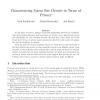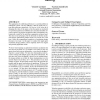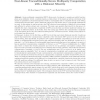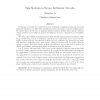8 search results - page 1 / 2 » Randomness Complexity of Private Circuits for Multiplication |
STOC
1996
ACM
13 years 8 months ago
1996
ACM
In this paper we prove a perhaps unexpected relationship between the complexity class of the boolean functions that have linear size circuits, and n-party private protocols. Speci...
ACMICEC
2003
ACM
13 years 9 months ago
2003
ACM
The aggregation of conflicting preferences is a central problem in multiagent systems. The key difficulty is that the agents may report their preferences insincerely. Mechanism ...
IACR
2011
12 years 4 months ago
2011
Secure multiparty computation (MPC) allows a set of n players to compute any public function, given as an arithmetic circuit, on private inputs, so that privacy of the inputs as we...
IACR
2011
12 years 4 months ago
2011
Traditional approaches to secure computation begin by representing the function f being computed as a circuit. For any function f that depends on each of its inputs, this implies ...
IACR
2011
12 years 4 months ago
2011
In this paper, we study the complexity of secure multiparty computation using only the secure arithmetic black-box of a finite field, counting the cost by the number of secure m...




